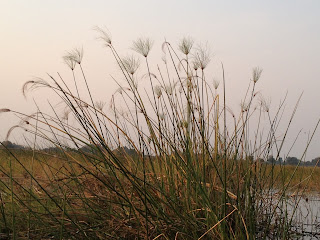Animal Count: elephant, giraffe, baboon, warthog, gemsbok, sable, water buffalo, kudu, impala, crocodile, antelope, banded mongoose, monitor lizard, ground squirrel, monkey
Victoria Falls have become known as the adventure capital of Africa. You can do any number of crazy things, as well as milder fare like walking among lions and elehants (!) But we weren't interested in any of these. To us, the town of Victoria Falls was interesting enough on its own and we opted for a slower pace.
There are not many cities or towns in the world that sit at the crossroads of four countries (Namibia, Botswana, Zambia, Zimbabwe). We were in the Zimbabwe side, but there is a bridge that acts as the border between Zimbabwe and Zambia, and its possible to get a pass to walk out halfway and return again without officially exiting and entering again. This bridge is known by the locals as ZimZam, and we put a toe over the line to get as close to another country as is legal.
 |
| Martin at ZimZam |
.jpg) |
| looking back to the bridge |
.jpg) The bridge straddles the gorge formed by the Zambezi river, with the famous Victoria Falls on one side. It was built in 1904 by the Brits (who did like their bridges) one year before the opulent Victoria Falls Hotel, which is still a picture into yesteryear's glamourous travel. The old railstop is there right in front of the hotel, and it would have been wonderful to travel the famed Cairo to Cape rail journey, stopping off here for a Pimm's in the garden, or a 7 course dinner in the grand dining room, or jsut a cup of tea out on the terrace with a view straight along the gorge to the falls framed by the bridge.
The bridge straddles the gorge formed by the Zambezi river, with the famous Victoria Falls on one side. It was built in 1904 by the Brits (who did like their bridges) one year before the opulent Victoria Falls Hotel, which is still a picture into yesteryear's glamourous travel. The old railstop is there right in front of the hotel, and it would have been wonderful to travel the famed Cairo to Cape rail journey, stopping off here for a Pimm's in the garden, or a 7 course dinner in the grand dining room, or jsut a cup of tea out on the terrace with a view straight along the gorge to the falls framed by the bridge.
 |
| Looking down to the Victoria Hotel and over lines for swinging over the gorge |
.jpg) |
| the old railway station |
.jpg) |
| lobby at the Victoria Fall Hotel gin and tonic anyone? |
 |
| the bridge with a bungee jumper in situ |
The falls are best seen by way of a national park, which is an excellent idea, because you leave behind all the cafes and touts, and walk from view point to view point each one more dramatic than the last. We are here in winter so the water level is very low, a third of what it is in the rainy season. I can't imagine that, it seems pretty impressive now!


We didn't wander anywhere here at night, not because it was dangerous with the human element, but because elephants and lions and warthogs roam the streets at night. During the day we see the warthogs as well as baboons and monkeys, but they are less worrying, especially in daylight. Our lodge manager warns us on pain of death close the big gate if we are going or coming, to ensure her garden does not become an elephant snack.
  |
| Martin as close to the falls as he liked |
Although this town is made for tourism and pretty well Zimbabwe's only hope of a peaceful income producing location, I had two dodgy meals experiences. The lodge had a brai our first night (as well as a rather cheesy native dance exhibition) and the sausage tasted a bit too gamey. The second night we were in a cheerful cafe Mama Africa, who also presented a rather cheesy native dance exhibition (by then I'd seen 4) and the worst salad I've ever had. Billed as a greek salad, it bore no resemblance to any greek salad I've had before, consisting largely of a rather meagre amount of raw onion, with one slice of red pepper, for which I had to pay $6 US. Hmm. won'tgo there again, although my fish as good - plain and unadorned, but good.








































